#studyhabits
Text
Effective Note Taking: Tips to Improve Your Study Habits
Note taking is an essential part of studying, and developing your own note taking style can significantly improve your learning experience. However, note taking should not just be a process of copying information from the board or textbook. It should be personalised to your learning style and optimised for effective retention and understanding. Here are some tips to improve your note taking habits:
Structure Your Notes for Organisation and Revision
Your notes should have a clear structure with headings, subheadings, and lists for better organisation and revision. Writing notes as if you were explaining the topic to someone who does not take the course is a good practice to ensure that your notes are clear and logical.
Additionally, labelled diagrams and concept maps can help you visualise and understand complex information. Studies have shown that visual aids, such as images and diagrams, are easier to remember and recall than text alone.
2. Highlight and Use Colours to Emphasise Key Points
Highlighters and coloured pens are not just for making pretty notes. They can also help you categorise and emphasise key points, making them easier to remember. Develop your own colour coding system, using different colours for different topics, definitions, or important information. Symbols, such as stars or underlines, can also be used to create your own coding system.
3. Use Your Own Words and Avoid Copying Verbatim
Avoid the temptation to copy everything word for word from the board or textbook. Instead, focus on deciphering the key information and paraphrasing it into your own words. This not only saves time but also helps you consolidate your understanding of the topic. You can still incorporate high-level vocabulary and terminology into your notes but try to write most of the content in your own words for better comprehension.

4. Consider Using Cornell Notes
Cornell notes are a popular note taking system recommended by universities such as Cornell and Harvard. They include a heading at the top, a column on the side for keywords, main ideas, and questions, a large section in the middle for class notes, and a summary at the end for revision. However, note taking is a personal process, and you should incorporate elements that work for you.
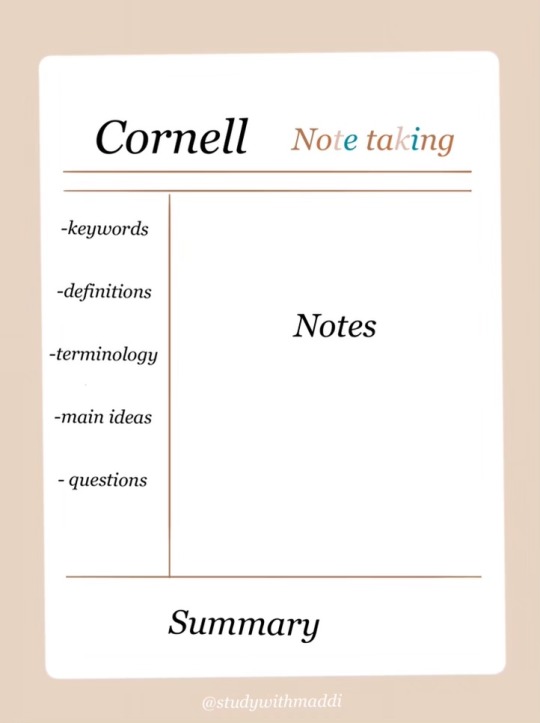
In conclusion, developing your own note taking style can significantly improve your study habits. Remember, note taking should be a personalised process that suits your learning style and helps you retain and understand the material better.
StudywithMaddi x
#studytips#notetaking#studyhacks#studyhabits#education#learning#Cornellnotes#colours#organisation#revision#memory#effectivestudy#learningtips#studentlife#studysmart#studymotivation#visualaids#studysuccess#studyskills#studywithmaddi
22 notes
·
View notes
Text
📕 Revising Work and Weekly Planning 🖥

#study#study online#studygram#study motivation#studying#bullet journal#bujo#passonplanner#studyhabits#harmonizinghabits#library#biblioteca#bibliothek
8 notes
·
View notes
Text
How to Manage Your Assignment Writing With Perfection?
Assignment writing is an integral part of academic life, requiring students to demonstrate their understanding of course materials and critical thinking skills. However, managing multiple assignments simultaneously can be overwhelming without proper planning and organization. In this article, we'll explore effective strategies to help you manage your assignment writing with perfection, ensuring that you meet deadlines and produce high-quality work.
Understand the Assignment Requirements: The first step in managing your assignment writing effectively is to thoroughly understand the requirements of each task. Take the time to carefully read the assignment prompt or brief provided by your instructor. Pay attention to details such as formatting guidelines, word count, citation style, and any specific instructions or expectations. Clarify any doubts you may have with your instructor to ensure that you're on the right track before you begin.
Create a Schedule: Once you understand the requirements of your assignments, create a realistic schedule that outlines the tasks you need to complete and their respective deadlines. Break down larger assignments into smaller, manageable tasks and allocate specific time slots for research, writing, editing, and revising. Be sure to include buffer time for unexpected delays or revisions. Use a planner, calendar, or digital task management tool to stay organized and track your progress.
Prioritize Tasks: Not all assignments are created equal, so it's important to prioritize your tasks based on their deadlines and importance. Identify which assignments require immediate attention and focus on completing them first. Consider factors such as the weightage of the assignment in your overall grade and the complexity of the task when prioritizing. By tackling high-priority assignments first, you'll reduce stress and ensure that you meet crucial deadlines.
Break Tasks Into Manageable Chunks: Large assignments can seem daunting, but breaking them down into smaller, more manageable chunks can make them more manageable. Divide the assignment into smaller tasks, such as conducting research, outlining, drafting, editing, and proofreading. Focus on completing one task at a time, and celebrate your progress along the way. Breaking tasks into manageable chunks not only makes them less overwhelming but also helps you maintain focus and productivity.
Manage Your Time Wisely: Effective time management is essential when managing your assignment writing. Set aside dedicated time for studying and writing each day, and eliminate distractions during these periods. Be mindful of how you spend your time and avoid procrastination by staying disciplined and focused on your goals. Remember to take short breaks to rest and recharge, but avoid getting sidetracked by non-essential activities.
Utilize Available Resources: Take advantage of the resources available to you to support your assignment writing process. This may include textbooks, academic journals, online databases, writing guides, and reference materials. Additionally, consider seeking assistance from your instructor, classmates, or academic support services if you encounter difficulties or need clarification on certain topics. Don't hesitate to reach out for help when needed.
Review and Revise: Before submitting your assignments, take the time to review and revise your work thoroughly. Check for grammatical errors, typos, and inconsistencies in your writing. Ensure that your arguments are logical, coherent, and well-supported with evidence from credible sources. Consider seeking feedback from peers or instructors to gain valuable insights and perspectives on your work. Revision is an essential step in the writing process that can significantly improve the quality of your assignments.
Managing your assignment writing with perfection requires careful planning, organization, and time management. By understanding the requirements of each assignment, creating a schedule, prioritizing tasks, breaking tasks into manageable chunks, managing your time wisely, utilizing available resources, and reviewing and revising your work, you can produce high-quality assignments that meet deadlines and demonstrate your academic excellence. With these strategies in place, you'll be well-equipped to excel in your academic endeavors and achieve success in your studies.
#AssignmentWriting#AcademicSuccess#TimeManagement#EffectivePlanning#StudySkills#TaskPrioritization#ProductivityTips#RevisionProcess#WritingStrategies#StudentLife#DeadlineManagement#AcademicExcellence#ResearchSkills#CriticalThinking#StudyHabits
0 notes
Text
The Power of Mindfulness for Students
Hey Tumblr,
We've all been there - buried in books, cramming for exams, our minds buzzing with deadlines and worries. It's easy to forget to take a breath, to live in the moment. That's where mindfulness comes in.
Mindfulness is not just a buzzword; it's a practice that can bring focus, reduce stress, and enhance our overall well-being. But how can we make mindfulness a part of our busy student lives?
We've just published a comprehensive guide titled "Mindfulness Activities for Students: Cultivating Focus and Well-being". This post is brimming with various mindfulness techniques - from breathing exercises and guided meditation, to mindful studying habits and technology use.
Even better, we delve into how these practices can be incorporated into school settings, creating a learning environment that promotes mental well-being alongside academic growth.
Whether you're a student, teacher, or parent, we believe that mindfulness can transform the educational experience, bringing a sense of calm and focus amidst the hustle and bustle of student life.
Check out the blog post [Mindfulness Activities for Students] and let's start a conversation about bringing mindfulness into the classroom!
#Mindfulness#Students#Education#AcademicPerformance#StressReduction#Focus#Wellbeing#MindfulTechniques#StudyHabits#MindfulTechnologyUse#ClassroomMindfulness#Meditation#BreathingExercises#spiritual community#the spiritual parrot
0 notes
Text
0 notes
Photo

5 Habits of Highly Successful Students. Good grades, exciting social engagements, and financial stability are among the top aspects that define a successful student. Here are five simple practices for you.
0 notes
Text
Did you know ?
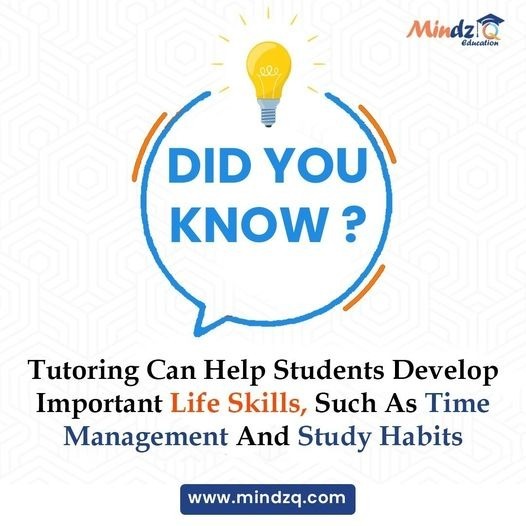
Did you know that tutoring can help students develop essential life skills beyond just academics?
Investing in tutoring for your child can help set them up for success both inside and outside the classroom. 🌟
Are you Looking For
✅ Math Tutoring
✅ English Tutoring
✅ English Reading & Writing
✅ Homework Help
Enroll Now👉 https://mindzq.com/K12-tutoring
Get Regular Updates:👇
Google My Business: https://bit.ly/3OozGM4
Twitter: https://twitter.com/MindzQEducation
Linkedin: https://www.linkedin.com/company/mindzq-education
Youtube: https://www.youtube.com/channel/UCwHEzDf4n3vSB6QWKjW_PAg
Instagram: https://www.instagram.com/mindzq_education/
#tutoring#lifeskills#timemanagement#studyhabits#education#success#onlinetutoring#studentsuccess#learning#growthmindset#academicexcellence#privatetutoring#privatetutor#tutoringservices#onlineschool#learnonline
0 notes
Text
Retaining new information can be challenging, especially when we are exposed to a lot of information every day. However, there are several strategies that can help us retain new information more effectively.
0 notes
Text
Getting your kids into a studying rhythm is a struggle for any parent. So the question is, how will parents instill good study habits? Gramlich’s book’s initial stages of communication provide good material for any parent struggling to make their child practice good study habits that will shape their lives for the long haul...
0 notes
Link
Do you have a hard time remembering new information? In this video, going to show you the 4 Best ways to retain new information so that you can learn and remember it for longer. do watch this video
0 notes
Text
How to Encourage Effective Study Habits: 7 Techniques for Improved Learning and Retention
Encourage effective study habits with these 7 techniques for improved learning and retention. #StudyHabits #EffectiveLearning #ParentingTips #AcademicSuccess
Effective study habits are the foundation of academic success. As a parent or educator, you play a crucial role in helping students develop these habits that lead to improved learning and retention. In this guide, we’ll explore seven techniques to encourage effective study habits, equipping students with valuable skills to excel in their studies and beyond.
The Importance of Effective Study…

View On WordPress
#Boosting retention through effective study#Effective techniques for studying#Encouraging effective study habits#Enhancing study habits#Learning improvement techniques#Promoting successful studying#Strategies for effective learning#Study habits for better grades#Study tips for better results#Techniques for improved learning and retention
0 notes
Photo



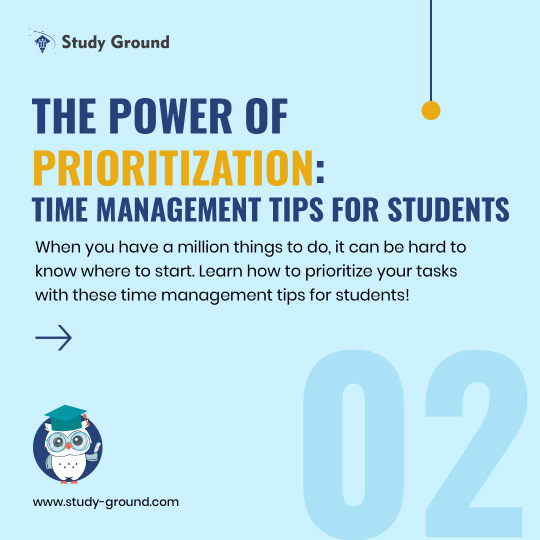
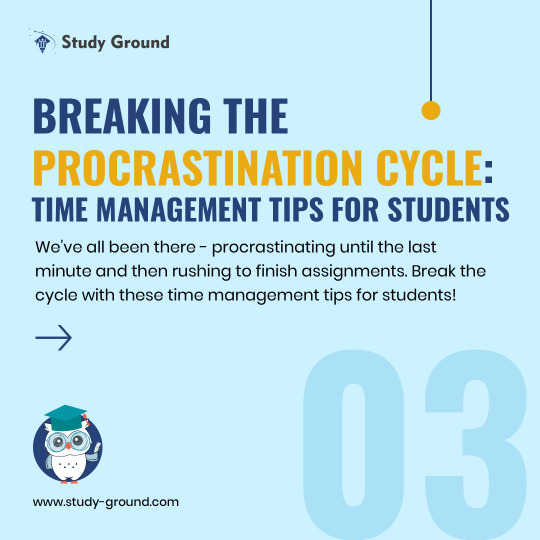
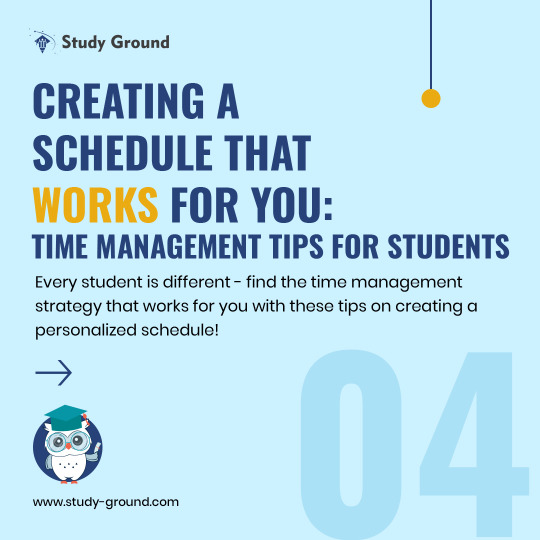

Effective time management is essential for students to achieve their academic goals. Here are some tips that can help students manage their time effectively and efficiently. #timemanagement #studytip #productivity #studentlife #timehack #studyhabits #prioritization #scheduling #timeblocking #goals
0 notes
Text
Tips to Control Phone Habits for a Healthy Study Plan - Part 2
Managing phone habits is crucial for maintaining a healthy study plan. Here are some more tips to help you control your phone usage and stay focused on your studies.
phonebabits #controlonphone #studyhabits #studyplan #smartphones #phoneusage #tipsforphone #studyhabits #upseducation #arvindotta #psychology #psychologist
0 notes
Text
Choosing the Right Study Materials: A Student's Handbook
tudying effectively is a crucial component of academic success, and the choice of study materials plays a significant role in this process. The right study materials can make learning more efficient, while the wrong ones can lead to confusion and frustration. In this blog post, we will explore the importance of selecting the right study materials, from textbooks to online resources, and provide guidance on how to discern reliable sources, utilize study guides effectively, and adapt your materials to your learning style and needs.
1. The Role of Study Materials:
Study materials are the tools that students use to understand and master the subjects they're studying. These materials can include textbooks, lecture notes, online resources, study guides, and more. The right materials provide clarity and structure, helping students grasp complex concepts and reinforce their learning.
2. Choosing the Right Textbooks:
Textbooks are often a primary source of study material in many academic disciplines. Here are some tips for selecting the right textbooks:
Read Reviews: Look for reviews or recommendations from professors and students who have used the same textbook. Their insights can be valuable in making an informed choice.
Check Editions: Ensure that you have the correct edition of the textbook. Older editions may lack updated information and can cause confusion.
Consider Your Learning Style: Different textbooks have different writing styles. Some are more concise and others more detailed. Choose a style that aligns with your learning preferences.
3. Online Resources:
The internet offers a vast array of resources that can complement your study materials. When using online resources:
Check Credibility: Ensure that the websites you use are reputable and the information is accurate. Look for government sites, educational institutions, and established publications.
Balance Resources: Don't rely solely on online materials. Use them as supplements to your primary study materials.
Be Mindful of Distractions: The internet can be a double-edged sword. While it offers valuable resources, it can also be a source of distractions. Practice discipline when using online study materials.
4. Study Guides:
Study guides, often provided by professors or available in bookstores, can be excellent companions to your primary materials. Here's how to use them effectively:
Outline Your Curriculum: Study guides typically align with your course curriculum. Use them to organize your study plan and ensure you cover all essential topics.
Practice Questions: Many study guides include practice questions and quizzes. These can be instrumental in testing your knowledge and preparing for exams.
Adapt to Your Learning Style: Study guides can be versatile. Adapt their use to your learning style, whether that's summarizing key points, creating flashcards, or making annotations.
5. Adapt to Your Learning Style:
One of the most critical aspects of selecting the right study materials is to align them with your individual learning style. Everyone learns differently, and understanding how you learn best can significantly impact your study material choices. Consider the following learning styles:
Visual Learners: Visual learners benefit from diagrams, charts, and infographics. They should seek materials that include visual aids.
Auditory Learners: Auditory learners learn best through listening. They might benefit from recorded lectures or podcasts.
Read-Write Learners: These learners prefer written materials. Textbooks and note-taking are valuable for them.
Kinesthetic Learners: Kinesthetic learners learn best through hands-on activities. They should engage in practical applications of their studies whenever possible.
Selecting the right study materials and adapting them to your learning style is a continuous process. As you progress through your academic journey, you'll refine your study material choices to align with your evolving needs and preferences. Remember that there's no one-size-fits-all approach, so explore and experiment with different resources until you find what works best for you. The ability to select and utilize the right study materials is a crucial skill for any student aiming for academic success.
#StudyTips#StudentLife#AcademicSuccess#StudyMaterials#EffectiveStudying#LearningStyles#StudyHabits#EducationMatters#OnlineLearning#Textbooks#DigitalResources#StudyGuides#LearningResources#StudentResources#TimeManagement#CredibleSources#AdaptToYourStyle#StudySmart#OnlineEducation#LearningJourney
1 note
·
View note
Text
ブログ更新しました!
"New post alert! Check out my latest article '英語学習者に贈る、10の習慣' on English Insights. Learn effective habits for achieving your language learning goals. Read now: https://infofromtokyo.com/englishinsights/ #EnglishLearning #LanguageLearningTips #StudyHabits"
0 notes
Photo
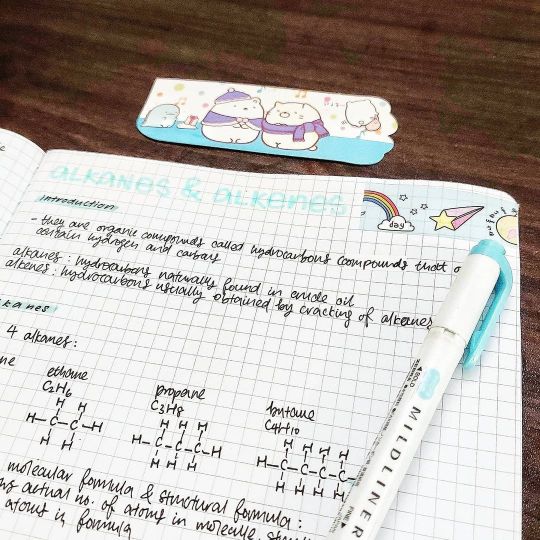
do like this washi tape a lot :“”) https://www.instagram.com/p/CQ_taUHBchk/?utm_medium=tumblr
#studygram#study#studycommunity#studymode#studying#studyhabits#studywithme#studyaccount#studyblr#studyblog#schoolnotes#notestagram#notebook#stationery#studyaesthetic#studytime
9 notes
·
View notes